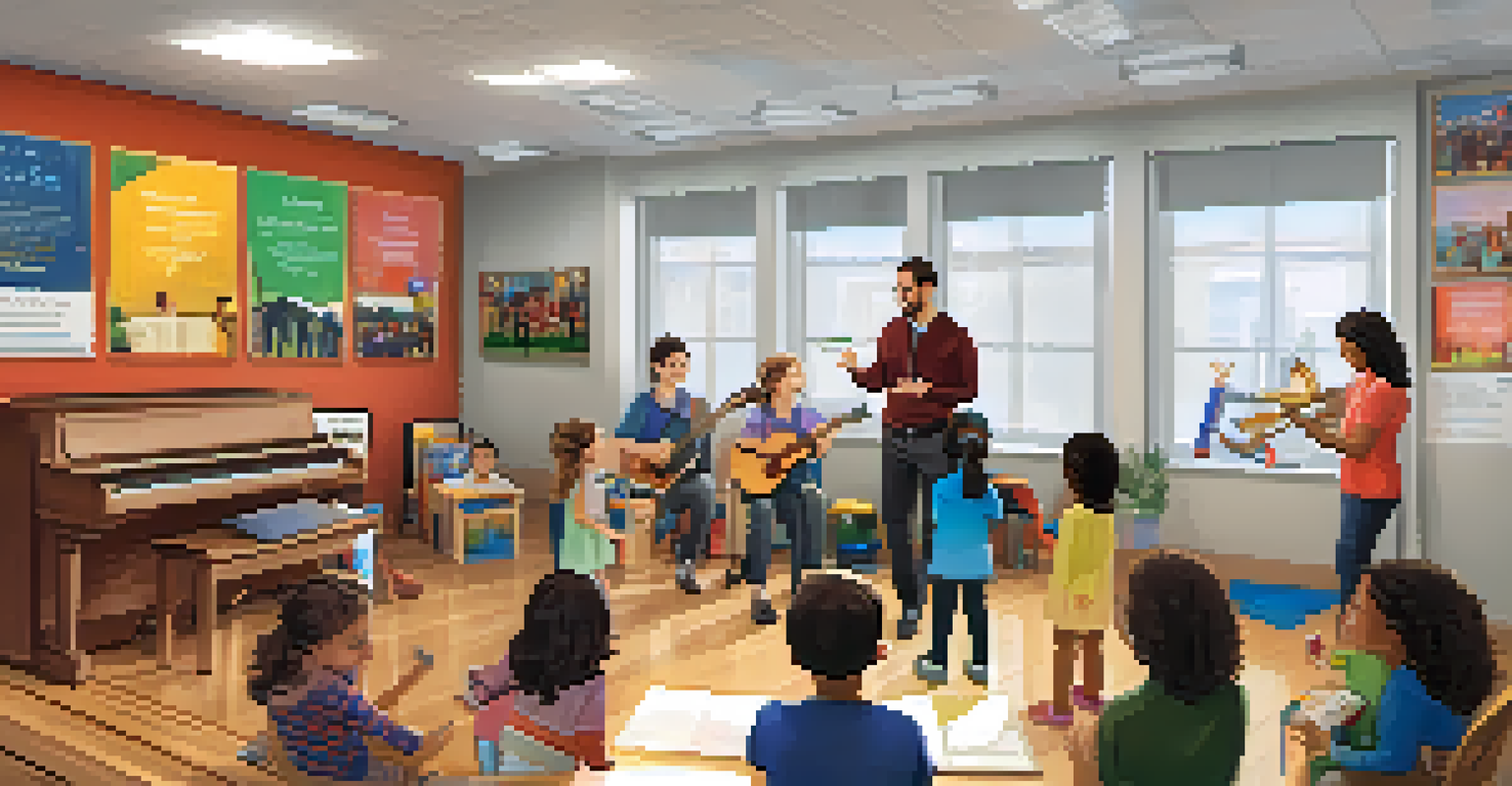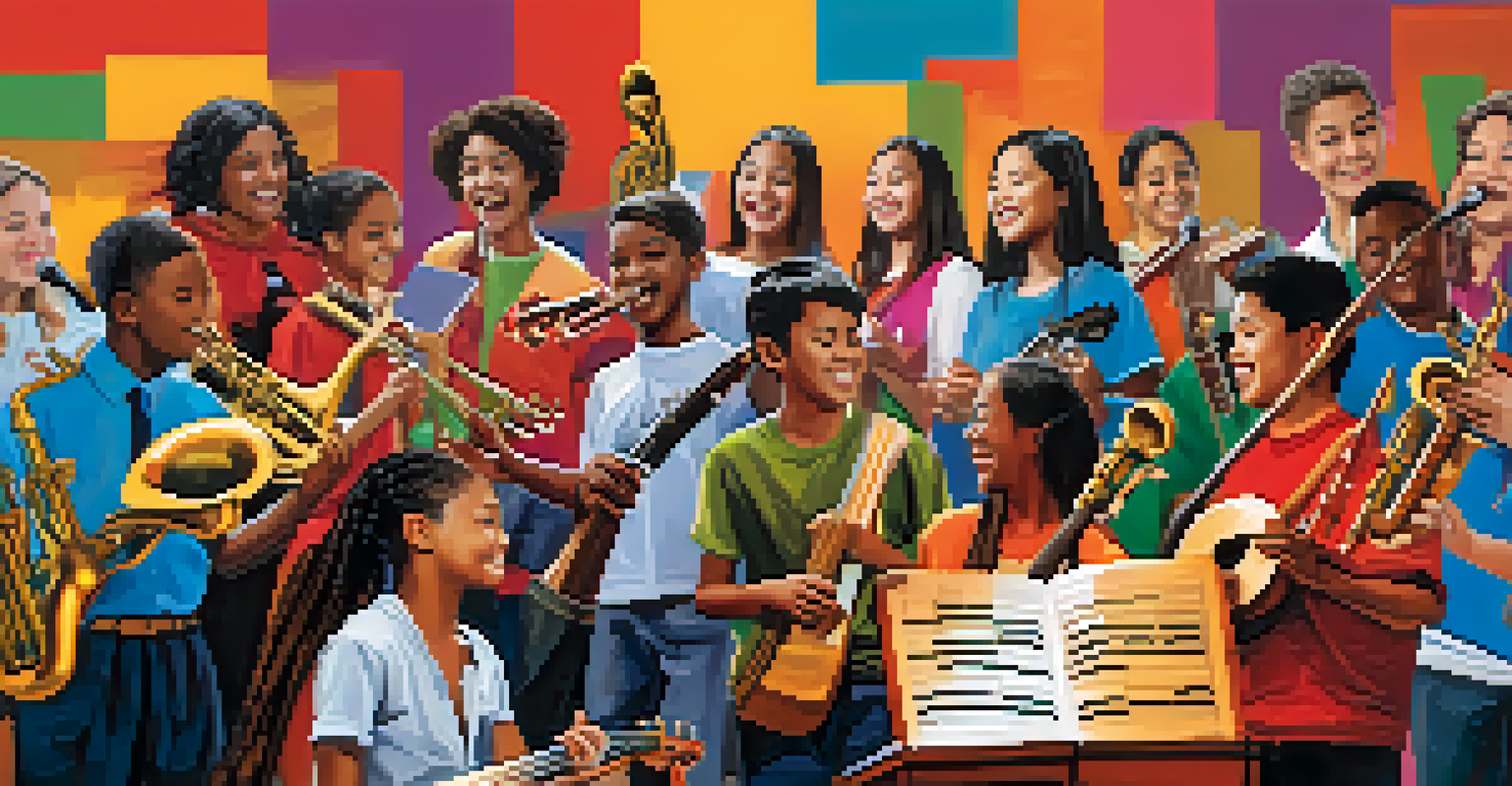Advocating for Music Education: Strategies for Policymakers

Understanding the Importance of Music Education
Music education plays a vital role in developing cognitive and social skills in students. Beyond just learning to play an instrument, students gain discipline, creativity, and teamwork skills. These qualities not only enhance their academic performance but also prepare them for future challenges in life and work.
Music education is a vital part of a well-rounded education and helps students develop critical thinking skills.
Research shows that students involved in music programs tend to score higher on standardized tests than their peers. This correlation underscores the value of integrating music into the curriculum. By recognizing its impact on academic achievement, policymakers can create more supportive environments for music education.
Moreover, music education encourages cultural awareness and appreciation. In a world that is increasingly interconnected, understanding diverse musical traditions fosters empathy and respect among students. This cultural enrichment can lead to more cohesive and inclusive communities.
Building a Strong Coalition for Advocacy
Successful advocacy for music education begins with forming a strong coalition. This coalition should include teachers, parents, students, and community leaders who share a passion for the arts. By uniting various stakeholders, advocates can amplify their message and present a united front to policymakers.

Engaging with local businesses and organizations can also enhance advocacy efforts. These partnerships can provide resources, funding, and platforms to raise awareness about the importance of music education. For instance, a local music shop might sponsor events or workshops that highlight student achievements.
Music Education Boosts Student Skills
Engaging in music education enhances cognitive abilities, creativity, and teamwork among students.
Additionally, social media can serve as a powerful tool for advocacy. Platforms like Facebook and Twitter allow advocates to share stories, successes, and statistics that emphasize the importance of music education. A single compelling post can reach thousands, spreading the message far and wide.
Creating Comprehensive Policy Recommendations
Policymakers need clear and actionable recommendations to support music education effectively. These recommendations should focus on funding for programs, teacher training, and curriculum development. By outlining specific needs, advocates can help policymakers understand what resources are essential for success.
The arts are an essential part of education, just like reading, writing, and arithmetic. Music is a part of that education.
One effective strategy is to highlight successful music programs as case studies. By showcasing schools that have excelled in music education, advocates can provide tangible examples of what works. This evidence can persuade policymakers to invest in similar initiatives elsewhere.
Incorporating input from music educators in the policy-making process is crucial. Their firsthand experience can provide valuable insights into the challenges and opportunities that exist within music programs. This collaborative approach ensures that recommendations are realistic and grounded in the realities of the classroom.
Leveraging Data and Research to Support Advocacy
Data and research play a critical role in advocating for music education. By presenting statistics on the benefits of music programs, advocates can make a compelling case for investment. For example, studies showing improvements in student engagement and graduation rates can sway policymakers who prioritize educational outcomes.
Moreover, qualitative data, such as testimonials from students and teachers, can humanize the statistics. Personal stories about the impact of music education on individual lives resonate deeply and can inspire action. These narratives can bridge the gap between numbers and the real-world implications of policies.
Community Support Strengthens Advocacy
Building coalitions with parents, teachers, and local businesses amplifies the message for music education.
It’s also important to stay updated on the latest research trends in education and music. Regularly sharing new findings with stakeholders can keep the conversation alive and relevant. This ongoing dialogue fosters a culture of support for music education in schools.
Engaging the Community Through Events and Workshops
Community engagement is vital for building support for music education. Hosting events and workshops that showcase student talent can energize parents and community members. These gatherings not only celebrate music but also strengthen community ties and encourage local investment in school programs.
Consider organizing a music festival or concert where students can perform. Such events can serve as a platform to highlight the importance of music education and its impact on student development. Additionally, they can raise funds to support music programs directly.
Workshops led by music educators can also provide parents with insights into the benefits of music education. These interactive sessions can demystify music teaching practices and help parents understand how to support their children's musical journeys at home.
Advocacy Through Policy Change and Legislation
Advocating for music education often involves influencing local and state legislation. Policymakers need to understand the broader implications of supporting arts education, including its role in holistic student development. Engaging in discussions about educational policy can create opportunities for change.
Advocates should also track current legislation affecting music education. By staying informed, they can mobilize support when key bills are introduced or under threat. This proactive approach ensures that advocates can respond swiftly to emerging issues.
Data-Driven Advocacy is Essential
Leveraging research and statistics strengthens the case for music education and informs policymakers.
Moreover, forming alliances with other advocacy groups can strengthen efforts. By collaborating with organizations focused on arts education, advocates can pool resources and expertise. Together, they can create a more powerful voice for music education in the political landscape.
Utilizing Social Media for Advocacy Campaigns
In the digital age, social media is a powerful tool for advocacy. Platforms such as Instagram, Twitter, and TikTok allow advocates to reach a wider audience with their messages. Creative campaigns that showcase student achievements can inspire others to support music education.
Using hashtags related to music education can help advocates connect with others who share their passion. By participating in trending discussions, advocates can raise awareness and engage in meaningful dialogues about the importance of arts education.

Additionally, creating shareable content such as infographics and videos can make the message more accessible. Visual storytelling can capture the attention of policymakers and the public alike, making complex ideas easier to digest and share.